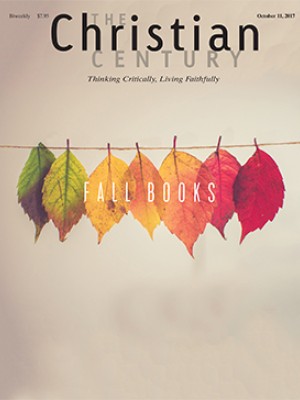October 29, Ordinary 30A (Matthew 22:34-46)
"Love God, love neighbor." Sounds simple.
The “Greatest Commandment” is important enough to make all three synoptic Gospels, though Luke has Jesus elicit the words from a Pharisee rather than say them himself. Jesus offers a simple midrash on two texts from the Pentateuch—one that has given direction to the church ever since.
The idea seems simple: “Love God, love neighbor.” The difficulties arise in the execution. Everyone I know who has made a serious, lifelong effort to live out these simple precepts has struggled with one or both of them. Who is God, and who is my neighbor? What does it mean to love them? Wrestling with these questions is at the heart of discipleship.
Read our latest issue or browse back issues.
Piety, in the best sense of the word, involves communally acknowledged ways of exploring who God is and what loving God looks like. Honoring, praising, blessing, imploring, worshiping—these are all forms of devotion to God, to the invisible ground of all being. I wonder if the physical ground of our childhood may also give some clues as to the nature of this God we love.
The plains of northwest Texas are an intimidatingly open country. It is as flat, brown, and round as a pecan-wood lazy Susan. Where I grew up, cotton was the primary crop, along with maize, alfalfa, peanuts, and pecans. Now vineyards are the new thing. So it is green in the growing season and brown the rest of the time. But at one time this was the southernmost part of an incredible grass savannah that stretched north into what is now Canada. Many early settlers lost their mind in the endless, unbroken landscape.
The original human inhabitants were the Plains Indians. There were many tribes and languages, but almost all lived in relationship to the American bison. My own people lived in relationship to plowed ground, hot sun, and cold irrigation water.
Museums have artifacts of the original cultures of this place, along with many artifacts of the successor culture of Anglo ranchers, farmers, and businesspeople. A Hispanic culture of workers sustains the predominant culture; it exists in counterpoint. Only little patches of the prairie itself remain. Yet the bowled blue sky and the round vista to the edge of human vision are still there to give proper scale to the human ego. This geography has shaped my understanding of God.
God and I have been on a months-long hiatus from speech. It has become the comfortable silence of familiar family, reminiscent of the long, silent drives with my father from one farm to another. We were in relationship, we knew what each other thought about most things, and we didn’t need to rehash it. We didn’t want an argument to disturb the peace. I knew who was in charge, and he knew he needed me to work the farm. We kept to our own thoughts. I now love God like that, my human father being long in the grave.
Love God with your heart, mind, and soul. After a lifetime of religious words heard, read, and spoken—chewed, spewed, and argued to every horizon of absurdity—it really does come down to these ones. I love God enough to wait for revelation to come. I trust that all my inadequate words, brashly proclaiming this and that in the name of the Trinity, have done more good than harm. My personal failures of faith and holiness have humbled me enough to recognize that if God’s word comes to the hearer, it does so in spite of me.
And who is my neighbor? When it comes to the big ethical questions that have long faced humans, this one is right up there with “Am I my brother’s keeper?” Neighborliness, however, was a given where I come from, amid the hard combat with the earth and its fickle weather that cotton farmers shared. Differences were minimized, commonalities self-evident.
We learned something about respecting the dignity of every human being—in spite of the hypocrisy of racist bias and oppression. The stories and words of Jesus, read and heard in our churches, turned many hearts among my little baby boomer cohort. The faraway witness of the heroes of the civil rights and peace movements convicted us. And the quiet contrariness of some of our mothers and fathers, our teachers and preachers, proposed a correction to the prevailing cultural norms.
The class of 1971 elected the first African American homecoming king; the first Hispanic queen followed a year later. We were a significant Anglo majority, but our hearts were beginning to turn. Our love of neighbor was slowly expanding beyond the Anglo family on the next farm over and the Anglo small business owners in town. The Word was at work, despite the conflicting words of West Texas culture.
Impatience with the slow, persistent Word that changes hearts and minds has a tendency to turn Christians into badly tuned flutes and ill-made gongs—Paul’s symbols for the absence of love. I pray for the church to trust in the endless horizon of God, in whom all things are possible. God is in charge, and if hearts are to be changed toward love of neighbor, God will need our trust—and our best abilities to till the soil.






